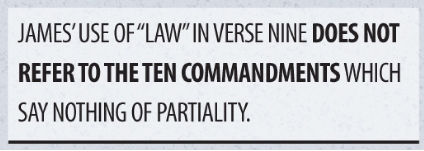ASK THE PASTOR WITH DALE RATZLAFF | Pastor and Founder, Life Assurance Ministries (1936–2024)
FIRST PUBLISHED IN THE PRINT VERSION OF PROCLAMATION! MAGAZINE, SUMMER, 2016.
Doesn’t James 2:10 teach that if you break the Sabbath, then you are guilty of violating the whole law?
In biblical interpretation we must always start with the context. The context is one of showing partiality to a well-dressed person wearing a gold ring and thereby giving this person a better seat in the church meeting place (see v. 1-7). Then, in verse 8, James refers to the “Royal Law”:
If, however, you are fulfilling the royal law according to the Scripture, “YOU SHALL LOVE YOUR NEIGHBOR AS YOURSELF,” you are doing well (Jam. 2:8).
In verse 9, James clarifies that showing partiality violates this royal law:
But if you show partiality, you are committing sin and are convicted by the law as transgressors (Jam. 2:9).
James’ use of “law” in verse 9 does not refer to the Ten Commandments which say nothing of partiality. Instead, James quotes Leviticus 19:18 and calls it the royal law of love which labels partiality a sin. To illustrate his point, James brings in the idea that one is a transgressor of the law if he breaks one commandment but keeps another. Then, in verses 12 and 13, we see that the law that will judge us is not the Ten Commandments, but a higher law, the law of liberty. As Paul states in Galatians,
For the whole Law is fulfilled in one word, in the statement, “YOU SHALL LOVE YOUR NEIGHBOR AS YOURSELF” (Gal. 5:14).
Now we come back to verse 10.
For whoever keeps the whole law and yet stumbles in one point, he has become guilty of all. (Jam 2:10).
If we insist James is encouraging keeping Old Testament law, we must realize how encompassing the “whole law” really is. I am indebted to former Adventist Margie Littell for the following list of what is included in the “whole law”, from which Jesus said not one jot or tittle can be excluded until all is fulfilled (Mt. 5:17-20). In this context, James 2:10 takes on a whole new meaning.

There are 10 commandments defining who God is. Six define the law, and five identify the signs and symbols of the law. Four tell how to pray, 14 tell how to treat other people, and 13 tell how to care for the poor and unfortunate. Six tell how to interact with the Gentiles (non-Jews).
Twenty-three laws tell how to divorce, marry, and cherish family, and 30 detail sexual practices to avoid. Twenty-seven tell how to keep the weekly and yearly Sabbaths, and 27 give dietary rules. Fourteen tell how to conduct business matters, and 19 tell how to treat employees, servants, and slaves.
Seven laws govern oaths and promises, and 17 tell how to observe each seventh year. Twenty-nine outline court and judicial procedures, four explain how to negotiate injuries and damages, and 11 mandate property and property rights.
Seven detail criminal laws, 24 outline punishment and restitution, and there are three standards of prophets and prophecy.
Forty-eight commands govern idolatry, idolaters, and idolatrous practices. Seven detail agriculture and animal husbandry practices, while three regard clothing.
Four regard firstborn children and animals. Thirty-nine detail the responsibilities and criteria of the Levites, and 23 mandate tithes and taxes. Thirty-two dictate caring for the temple, the sanctuary and sacred objects, while 101 detail sacrifices and offerings.
Fifteen mandate ritual purity and impurity, and four govern lepers and leprosy.
Seven define leaders of the people, and 10 outline rules for Nazarites. Sixteen commands govern conducting wars.
In conclusion, we cannot read James without taking his context seriously. Paul summarized this situation well in Galatians 3:10:
For all who rely on works of the law are under a curse; for it is written, “Cursed be everyone who does not abide by all things written in the Book of the Law, and do them” (Deut. 27:26).†
- 17.A Better Law - July 3, 2025
- 16. A Better Covenant - June 25, 2025
- 15. New Covenant Documents and Signs - June 19, 2025
